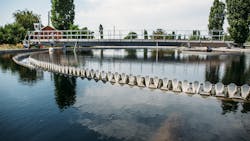For too long, many of us in the water and wastewater industry have ignored the workforce shortage and disinterest in filling the gaps left by the coming wave of retirements in our industry. I’ve seen various aspects of the workforce problem since my early days working for two state rural water associations, and over the past 20 years interacting with audiences of water and wastewater operators twice a month. Here, I’ll offer some suggestions to improve matters.
If our country is to attract, develop, and retain water and wastewater plant operators, then we need to face facts. First and least troublesome of these facts is that water and wastewater plant operation is a nearly invisible profession. Worse, plant operation is not regarded as an especially attractive line of work. Pay is part of this problem of perception, but even when and where the money and benefits are good, there can still be a negative association. To speak plainly, wastewater has an image problem that to a certain degree carries over to potable water treatment. We can begin to address this situation through such simple acts as stressing the essential work operators perform, by posting operator profiles on organization websites, by recognizing operator employees on signage near plant entrances, by engaging teachers and career counselors at middle and high schools, and by sending operators to career day events at those same schools.
The second and more challenging fact we must address is that most utility plant operation is a 24/7/365 proposition. Working all night in cold, bad weather or at some dirty or dangerous job at one’s workplace is not something many people look forward to. In a full-employment economy, this fact alone makes utility operations a hard sell. Employees working swing shifts can be sleep-deprived, cranky, irritable, or depressed. Even when rested, utility workers — and their families — live outside the mainstream when it comes to celebrating family events and holidays. Their schedules just don’t align with those of other people. And shift work carries only negative health effects in respect to metabolism, diabetes, weight management, sleep quality, cognition and mental health, or cardiovascular health.
The shift work dilemma is difficult to address, even though it’s one common to various other professions such as nursing and policing. Fixed shifts may be somewhat better, and we could give employees beneficial instruction in sleep hygiene, appropriate exercise, diet and nutrition, methods of avoiding or limiting blue light and screen time, and so on. Managers and operators together could — and should — investigate shift schedules that might be less deleterious. And we should pay shift workers a differential, so that they can at least believe their decision to work shifts is a rational one.
A third fact is that management and human resources departments need to do a better job onboarding new people for water and wastewater operator positions. Customer service at a utility organization mustn’t be only about external customers. Here again, those who’ve never worked in the industry don’t really understand the nature of that work. HR personnel really need to pull a few 12-hour midnight shifts at a water or wastewater plant to get the idea — and then stay overtime. In addition, there’s the fact that utility employees are essential workers. In our industry, just as in nursing or policing or firefighting or generating power, people must actually be physically in the workplace. There’s no operating from home here, no taking a few days off, little or no flex time. People are critical to operations, and those operations are scheduled. So, vacancies must be filled. Advertising, interviewing, investigating backgrounds, selecting, notifying and hiring cannot and must not take 3-6 months. Applicants aren’t interested indefinitely, and the private sector moves faster. This means that filling open positions must be prioritized, expedited, streamlined, and fast-tracked; there’s no other way to put it.
A fourth fact is that licensing examinations may well present undue barriers to attracting and keeping good, capable people. States may wish to assert that their licensing and certification programs are robust and rigorous, and they may prefer to turn examination development and administration over to vendors, but there is arguably something wrong when examinations fail prepared candidates multiple times. Trouble is, managers may believe the defect lies in their candidate, not in the examinations, so candidate employees may not have management support. In Virginia, for example, people retaking a different examination at the same level do no better and in fact do even worse than they did initially. Beyond reminding me of SAT test performance in high school, this not only flies in the face of expectations, it discourages people profoundly.
“One size fits all” national exams that fail many actually appear to fit few. I don’t say make examinations short or easy. I say give candidates enough time, eliminate unscored trial questions, reduce the number of exam content areas and better delineate those. Make examinations fair and reasonable and appropriate for the particular state. Let’s recognize that the design of plants and the operation of plants require different skill sets. And let’s quit chasing the notion of seamless license reciprocity between states. It doesn’t exist even for driver’s licenses, to say nothing of most professional licenses. Let’s press utilities and state licensing boards — and even state legislatures if need be — to review and finally begin to act in these areas.
We must rethink the question of how we want people to enter this profession. Job requirements and pay incentives will always pair with human ambition to result in people growing in their chosen field. Here we must remember that growth is the intent of operator continuing education requirements in place in all states. I believe in and regard intellectual effort and academic achievement highly. At the same time, I’d argue that we get people in the door before we turn them away. And couldn’t we encourage and assist operators to get further education after they come to work for the utility, perhaps once we have a few operators to spare? Different kinds and degrees of educational assistance could be made a reality. Individuals may then even study subject matter that will benefit them in their jobs. I think now of formal coursework we could all benefit from in electricity, electronics, chemistry, mathematics, microbiology, or physics.
To improve the workforce picture, we may pursue several sensible approaches. One is the apprenticeship idea. Give facility tours and identify employable people still in or just out of high school. Let people intern as water and wastewater operators to show them what this industry is about.
In more populous and urban areas, more and better community college courses could help, perhaps in the form of focused coursework that leads to a certificate in no more than a year. A basic and worthwhile state or regional curriculum could be devised to accomplish this. Another, yet by no means last or insignificant idea here, is to encourage and empower individuals to educate themselves in the field of water and wastewater treatment operations. Here most states have it backward, in that someone has to first get a job, then take and hope to pass the certification or licensing examination. Instead, more states could do what North Carolina does, and offer progressive short schools and examinations for provisional or apprentice licenses. In this way candidates for employment can say, “Look, I’m really prepared to start this career. I’ve done this much on my own, I have passed the examination. I just need six months’ experience on the job to earn my full first-level license.”
Finally, those of us currently working in the field must be advocates of and recruiters for the many positives of the drinking water and wastewater profession. Here we must enthusiastically and sincerely make the case that water and wastewater is worthy, important, and honorable work. It is the work of public health and environmental protection — not performed from a regional headquarters or from behind a regulator’s desk, not always completed from a clean and pleasant office, but from the front lines. In addition, utilities present many career opportunities for both lateral and upward mobility and growth. To say nothing of that fact that our profession offers job security and often good benefits, each of which carries monetary value. Spell these out. Stress the positives. And don’t forget to mention that our workdays offer variety, exercise, excitement, and even adventure. WW
About the Author

Dennis R. Wanless
Dennis R. Wanless develops and presents operator continuing professional education classes in Virginia and is the author of the new book Drinking Water Treatment—Principles and Insights. He may be reached at denniswanless.com.

